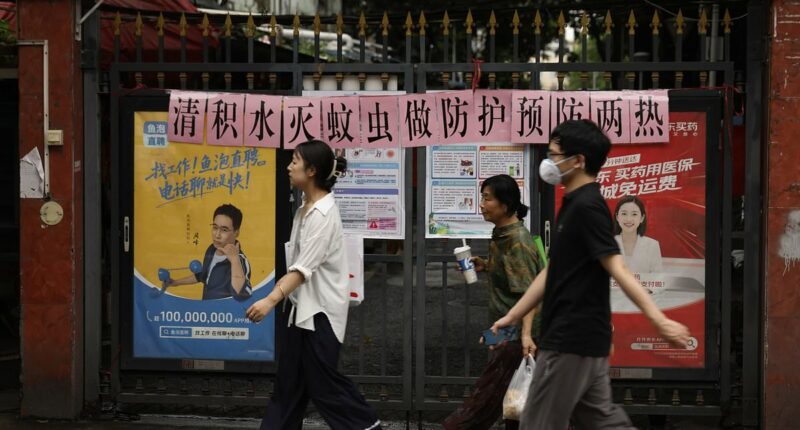Share this @internewscast.com
Officials across China have implemented Covid-era preventive measures across the country as the chikungunya virus outbreak continues to spread.
Over 7,000 cases have been reported in the southern city of Foshan, while 12 other cities in the Guangdong province have reported at least 3,000 cases, bringing the national total to over 10,000.
As a result of the rampant spread, patients in hospital wards are being covered with mosquito nets and are required to remain there for a week, or until they test negative for the virus, if sooner.
A chikungunya infection causes fever, joint pain and, in severe cases, life-threatening complications involving the heart and brain.
Images show Chinese state workers spraying clouds of disinfectant around city streets, residential areas and construction sites where people may come into contact with virus-bearing mosquitoes in or near standing water.
Drones are being used to hunt down insect breeding grounds and spray insecticide, and residents are being asked to empty bottles, flower pots or other outdoor receptacles that may collect water.
Failure to comply with any restriction may lead to fines of up to $1,400 (10,000 Yuan) and locals can have their electricity cut off, according to state media.
While it’s unclear exactly where the infection began, the virus is now spreading across the world and the CDC has issued a Level 2 travel risk notice for Brazil, Colombia, India, Mexico, Nigeria, Pakistan, the Philippines, Thailand and China.

A hospital staff member carries out disinfection work amid an outbreak of chikungunya in Foshan

A drone sprays insecticide to prevent the spread of Chikungunya in Dongguan, Guangdong
No deaths have been reported but those experiencing fevers, joint pain or rashes are being asked to visit the nearest hospital so they can be tested for the virus.
Chinese office employees have also been spotted spreading disinfectant around buildings before entering, a stark reminder of the controversial hardline tactics used by the country to control the Covid pandemic in 2020.
Reports from local media have also emerged of attempts to stop the virus spread by breeding fish that eat mosquito larvae and even larger mosquitoes to eat the insects carrying the virus.
Additionally, officials had ordered travelers from Foshan to undergo a 14-day home quarantine, similar to Covid restrictions, but that has since been withdrawn.
Chikungunya is primarily spread by Aedes mosquitoes — the same species that carry dengue and Zika. It is rarely fatal but can cause debilitating symptoms.
Chikungunya infections are most common in Asia, Africa and South America, though more recently cases have also emerged across Europe and the US.
Nearly half a million people were infected during a major outbreak in 2004–2005, which spread across Africa, Asia and the Americas.
Dr Diana Rojas Alvarez, a medical officer with the World Health Organization, warned: ‘We are seeing history repeating itself,’ referencing the scale of the earlier epidemic.

Residents walk past a residential entrance gate displaying a slogan urging mosquito control in Guangzhou
A global spike in cases began in early 2025, with major outbreaks reported in the Indian Ocean islands of La Réunion, Mayotte and Mauritius.
According to the European Centre for Disease Prevention and Control, around 240,000 chikungunya cases and 90 related deaths have been recorded in 16 countries so far this year, as of August 4.
The virus has also spread to Madagascar, Somalia, Kenya and India and is making its way to Europe.
Case counts have also been increasing in Samoa, Tonga, French Polynesia, Fiji and Kiribati.
As of the latest update on July 26, the Pan American Health Organization (PAHO) reports 47 cases of chikungunya infection in the US this year
The CDC reports all the cases were contracted by travelers returning from high-risk areas. No deaths have been reported.
Roughly 200 travel-related cases were reported in the US in 2024, with no fatalities.
According to the CDC, chikungunya was rarely detected in American travelers before 2006. But between 2006 and 2013, the US logged around 30 imported cases a year, all in people who had recently visited affected regions in Asia, Africa or the Indian Ocean.
In 2014, a total of 2,799 cases were reported – including 12 that were locally acquired – in states and territories such as Florida, Texas, Puerto Rico and the US Virgin Islands, making it the country’s worst year on record for the virus.

Workers carry out maintenance work on green spaces during an operation aimed at mosquito control

A staff member hangs mosquito monitoring device in Xinkaikou village
Brazil has recorded the most cases as of August 2, with 201,544, according to PAHO.
Chikungunya is not spread through bodily fluids or saliva, it can only be transmitted by the bite of an infected mosquito.
It also cannot be transmitted from person to person. Instead, the virus spreads when a mosquito bites an infected person, becomes a carrier, and then bites someone else.
Though rarely fatal, chikungunya can cause a range of symptoms, most notably a sudden onset of fever and intense joint pain.
Other common effects include muscle aches, headache, nausea, fatigue and skin rash.
The acute phase of illness typically resolves within one to two weeks, but joint pain may linger for weeks, months or even years in some cases.
In rare instances, chikungunya infections can lead to severe complications affecting the eyes, heart and nervous system.
Newborns, seniors over 65, and people with underlying health issues face a higher risk of developing serious outcomes, including cardiovascular problems and, according to some studies, even Type 2 diabetes or high blood pressure triggered by post-viral inflammation.
Pregnant women who become infected near the time of delivery can also pass the virus to their baby during birth, which can result in severe illness in the newborn.

A staff member carries out mosquito eradication work on a green belt in Guangzhou
There is no antiviral treatment for chikungunya, but symptoms can be managed with rest, plenty of fluids, and pain relief such as acetaminophen.
The CDC is urging Americans to ensure they are vaccinated if they are at increased risk of exposure while traveling to countries experiencing an outbreak.
In late 2023, the FDA approved a vaccine called IXCHIQ for adults aged 18 and older, and in February 2025, a second vaccine, VIMKUNYA, approved for people aged 12 and up, was licensed.
Both vaccines are non-routine and recommended only for travelers heading to outbreak areas or for laboratory workers at risk.













